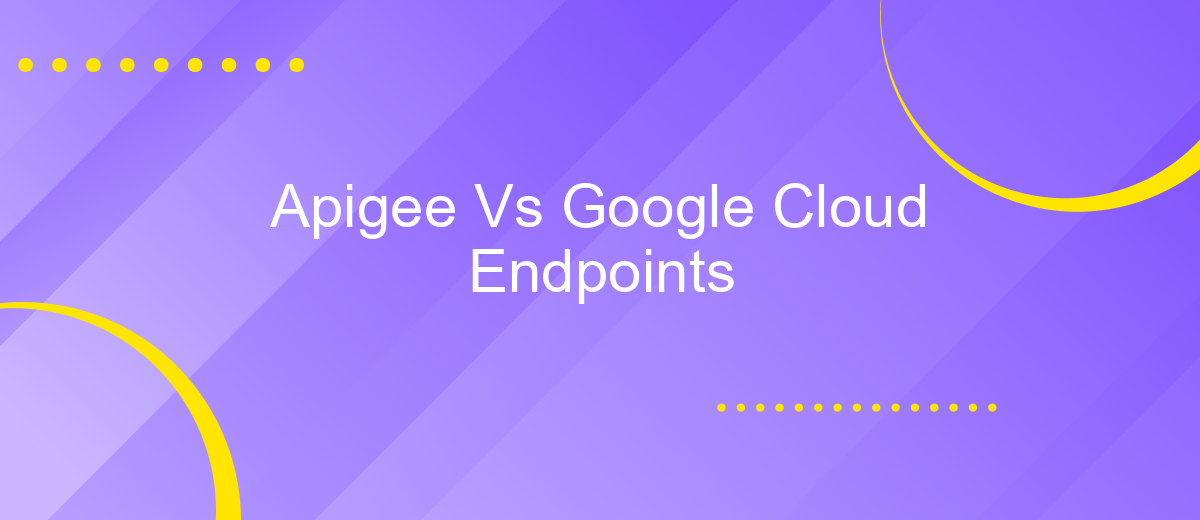Apigee Vs Google Cloud Endpoints
When it comes to API management, choosing the right platform is crucial for ensuring seamless integration, security, and scalability. Apigee and Google Cloud Endpoints are two robust solutions offered by Google, each with its own set of features and benefits. This article delves into a comparative analysis of Apigee and Google Cloud Endpoints to help you determine which is best suited for your needs.
Introduction
In the rapidly evolving world of API management, choosing the right platform is crucial for seamless integration and efficient operation. Apigee and Google Cloud Endpoints are two leading solutions that offer robust features for API management, each with its own strengths and unique capabilities. Understanding the differences between these platforms can help businesses make informed decisions that align with their specific needs and goals.
- Apigee: A comprehensive API management platform that provides tools for designing, securing, deploying, and monitoring APIs.
- Google Cloud Endpoints: A fully managed service that allows developers to create, deploy, and manage APIs on Google Cloud, with integrated features for security and monitoring.
- ApiX-Drive: A versatile service that facilitates the integration of various platforms and automates workflows, enhancing the efficiency of API management processes.
By comparing Apigee and Google Cloud Endpoints, this article aims to highlight their key features, advantages, and use cases. Additionally, we will explore how ApiX-Drive can complement these platforms by providing seamless integration capabilities, thereby optimizing API management and enhancing overall productivity.
Features

Apigee and Google Cloud Endpoints offer powerful features for managing APIs, but they cater to different needs. Apigee provides advanced API management capabilities including traffic management, security, analytics, and developer portals. It supports hybrid and multi-cloud environments, making it a robust choice for enterprises looking for comprehensive control over their APIs. Apigee's monetization features also allow businesses to generate revenue from their APIs, providing an additional layer of value.
Google Cloud Endpoints, on the other hand, is more lightweight and tightly integrated with Google Cloud services. It offers essential API management features such as authentication, monitoring, and logging, making it ideal for developers already invested in the Google Cloud ecosystem. For those who require seamless integration and automation, services like ApiX-Drive can be beneficial. ApiX-Drive allows users to connect different applications and automate data flows without needing extensive technical knowledge, thus enhancing the overall efficiency of managing APIs through Google Cloud Endpoints.
Benefits

Choosing between Apigee and Google Cloud Endpoints can significantly impact your API management and development process. Both platforms offer unique advantages that cater to different needs and use cases.
- Scalability: Apigee provides enterprise-grade scalability to manage large volumes of API traffic, making it ideal for large organizations. Google Cloud Endpoints, integrated with Google Cloud, offers seamless scaling options for cloud-native applications.
- Security: Apigee offers advanced security features such as OAuth, API keys, and threat protection. Google Cloud Endpoints also ensures robust security with built-in authentication and monitoring tools.
- Integration: Apigee supports extensive third-party integrations, including ApiX-Drive, which facilitates easy and automated connections between various services and applications. Google Cloud Endpoints integrates smoothly with other Google Cloud services, providing a cohesive ecosystem for developers.
- Analytics: Apigee's detailed analytics and monitoring tools help track API performance and usage patterns. Google Cloud Endpoints also offers comprehensive monitoring through Stackdriver, enabling proactive issue resolution.
In conclusion, the choice between Apigee and Google Cloud Endpoints depends on your specific requirements. Apigee is suitable for enterprises needing robust security and extensive integrations, while Google Cloud Endpoints is perfect for those leveraging the Google Cloud ecosystem for their applications.
Considerations

When comparing Apigee and Google Cloud Endpoints, it's essential to consider the specific needs of your project. Both platforms offer robust API management solutions, but they cater to different use cases and requirements. Apigee is known for its comprehensive features and enterprise-level capabilities, while Google Cloud Endpoints is more streamlined and integrated with other Google Cloud services.
One of the primary considerations is the scale and complexity of your API management needs. Apigee provides extensive tools for analytics, security, and monetization, making it suitable for large enterprises with complex API ecosystems. On the other hand, Google Cloud Endpoints is ideal for smaller projects or teams already heavily invested in the Google Cloud ecosystem.
- Integration capabilities: Apigee offers more extensive third-party integrations.
- Cost: Google Cloud Endpoints can be more cost-effective for smaller projects.
- Ease of use: Google Cloud Endpoints is simpler to set up and manage.
- Features: Apigee has more advanced features for API management.
Additionally, consider using integration services like ApiX-Drive to streamline the process of connecting various applications and services. ApiX-Drive can automate workflows and ensure seamless data transfer between your APIs, enhancing the overall efficiency of your API management strategy.
Conclusion
In conclusion, both Apigee and Google Cloud Endpoints offer robust solutions for API management, each with its own set of strengths. Apigee excels in providing comprehensive API analytics, advanced security features, and a wide range of customization options, making it ideal for large enterprises with complex needs. On the other hand, Google Cloud Endpoints integrates seamlessly with other Google Cloud services, offering a more streamlined and cost-effective solution for developers already invested in the Google ecosystem.
When choosing between these two, it's crucial to consider your specific requirements, such as the scale of your operations, the need for detailed analytics, and your existing technology stack. Additionally, leveraging services like ApiX-Drive can further enhance your API management strategy by simplifying the integration process and automating workflows. Ultimately, the right choice depends on balancing your immediate needs with long-term scalability and efficiency goals.


FAQ
What are the primary differences between Apigee and Google Cloud Endpoints?
Which platform is better for large-scale enterprise applications?
Is it possible to migrate APIs from Google Cloud Endpoints to Apigee?
What are the costs associated with using Apigee and Google Cloud Endpoints?
Can I automate API integrations and configurations with these platforms?
Routine tasks take a lot of time from employees? Do they burn out, do not have enough working day for the main duties and important things? Do you understand that the only way out of this situation in modern realities is automation? Try Apix-Drive for free and make sure that the online connector in 5 minutes of setting up integration will remove a significant part of the routine from your life and free up time for you and your employees.

